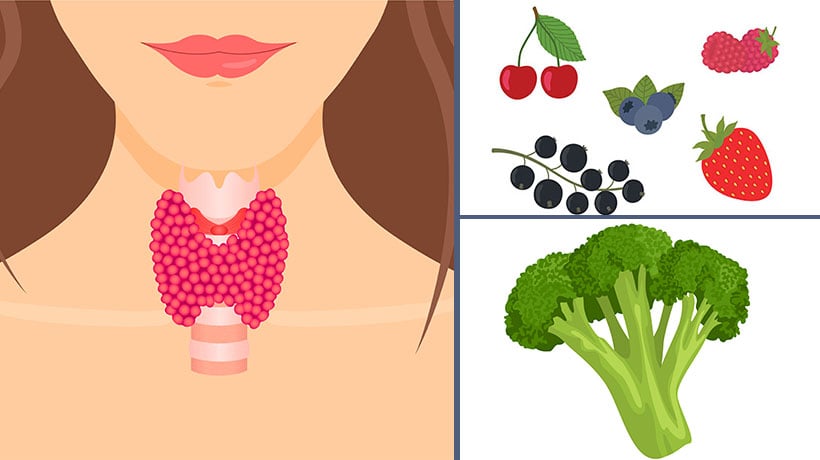We’ve all seen (or even fallen prey to) the latest gluten-free diets and keto-crazes. But many of us are neglecting a small, but very important part of our bodies: our thyroid. The thyroid is a butterfly-shaped gland located in the front of your neck that produces hormones which regulate your body’s energy use, along with several other important functions.
Hypothyroidism occurs when your thyroid doesn’t make enough hormones to function well, and in turn causes a slowed metabolism and weight gain. Hyperthyroidism occurs when your body produces too much thyroid hormone, which can cause a fast heartbeat, increased appetite, anxiety, sensitivity to heat, or sudden weight loss.
According to the American Thyroid Association, an estimated 20 million Americans have some form of thyroid disease. And up to 60 percent of those with thyroid disease are unaware of their condition. Women are also five to eight times more likely than men to have thyroid problems. The following foods may be helpful in keeping the thyroid healthy. As always it’s important to check with a medical professional about treatment and checkups.
Almonds
Nuts usually contain selenium, which is a nutrient that’s good for your thyroid. But almonds contain selenium and magnesium, which can keep your thyroid working properly if you have hypothyroidism.
Spinach
We’ve always known spinach was good for you, but for those with hypothyroidism, it’s even better. People with hypothyroidism tend to have a zinc deficiency. Spinach is packed full of zinc, which makes it a great addition to meals for those with an underactive thyroid.
Turmeric
This spice typically used in curry has a ton of health benefits. It contains a chemical compound called curcumin, which has been shown to lower your risk of heart disease, improve brain function, and block the formation of thyroid cancer cells, making it a good option for those with hypo- and hyperthyroidism.
Broccoli
Broccoli is a cruciferous vegetable, which are rich in folate, vitamins C, E, and K, and fiber. Cruciferous vegetables are known to decrease the amount of thyroid hormone the thyroid gland produces, making them an excellent choice for those with hyperthyroidism. Other cruciferous vegetables include cauliflower, brussels sprouts, and cabbage.
Salmon
Salmon contains vitamin D, which helps prevent bone loss, as well as a megadose of omega-3 fatty acids that are good for your health. This is also a good food for those with hyperthyroidism, as their bodies may not produce the fatty acids they need.
Navy beans
A study published in the Annals of Pediatric Endocrinology & Metabolism showed that foods high in iodine help keep your thyroid’s hormone levels balanced if you have hypothyroidism. While iodine is in most beans, it’s especially prevalent in navy beans, which have about 60 micrograms of iodine in one cup.
Seaweed
Speaking of iodine, seaweed is another great source for the nutrient. Other sea vegetables, like kelp, also contain large amounts of iodine, which is essential for the production of thyroid hormones.
Turkey
Turkey is a good source of protein, which your body uses for energy and building and maintaining muscle. Those with hyperthyroidism may struggle with sudden weight loss, so eating enough protein can help them stay at a healthy weight. Nuts and beans are also great sources of protein for those who don’t eat meat.
Dairy
Dairy contains calcium, which is a mineral that helps keep our bones healthy. If left untreated, hyperthyroidism can weaken bones and lead to osteoporosis. That’s why it’s important for those with hyperthyroidism to get at least three servings of calcium a day from yogurt, milk, or cheese.
Berries
Blackberries, blueberries, strawberries, oh my! All of these berries are packed with antioxidants, which is helpful for your thyroid. A study published by the National Center for Biotechnology Information showed that those with thyroid disease had higher levels of free radicals (toxic byproducts of oxygen metabolism) threatening their system. The antioxidants in berries help fight and eliminate free radicals.
Sources:
https://www.thyroid.org/media-main/press-room/
https://www.endocrineweb.com/conditions/hyperthyroidism/5-foods-may-help-ease-hyperthyroidism-symptoms
https://bestlifeonline.com/best-thyroid-foods/
https://www.ncbi.nlm.nih.gov/pmc/articles/PMC3746228/
https://www.metabolismjournal.com/article/0026-0495(88)90030-3/fulltext
https://www.ncbi.nlm.nih.gov/pubmed/25349216
https://e-apem.org/journal/view.php?number=564
https://www.ncbi.nlm.nih.gov/pubmed/18605962



